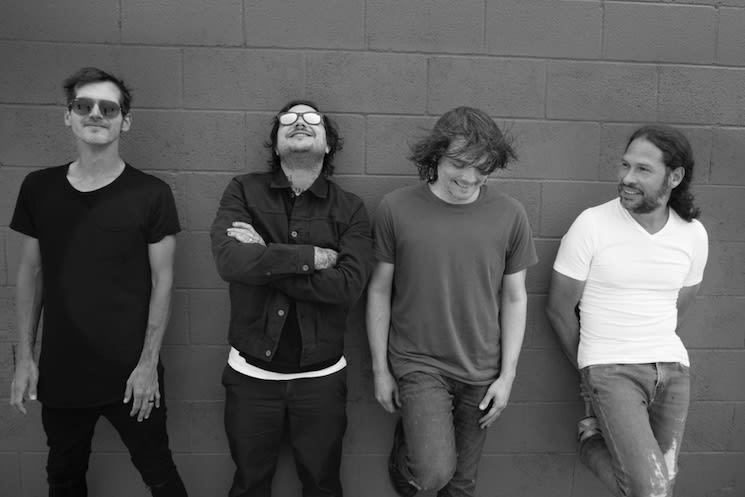On January 31, 2020, My Chemical Romance broke the internet.
Fans had spent years waiting for the band to reunite, following their 2013 breakup. Things finally began to heat up in 2019, when Joe Jonas slyly let it slip that My Chemical Romance had been rehearsing next door to the Jonas Brothers. The first message from the band over socials concerned a one-off gig on December 20 at the Shrine Expo Hall in Los Angeles, CA, which received rave reviews. The hype machine was in high gear in January 2020 when tickets for their reunion tour went on sale — and the demand was such that Ticketmaster couldn't handle the traffic. Within six hours, all 18 of the band's tour dates sold out.
The stage was set for the group's full-fledged return in 2020 — but fans would have to keep on being patient for a couple more years. The first show of their tour had been planned for March 20 in Australia, with European dates set for the summer, and a North American tour running through the fall. The dates were postponed until 2021, and then postponed again. Fans couldn't help but feel cheated — their band had returned, only to be sidelined right when they were due to hit the road.
It's a very different reunion story than anyone could have expected, but that should come as no surprise: My Chemical Romance have always stood out from the crowd.
Formed in 2001 by aspiring comic book artist Gerard Way and named by his younger brother and bassist Mikey Way after an Irvine Welsh book, the band rose up amongst the ranks of New Jersey's underground punk scene seemingly overnight. With their dual guitar attack of Ray Toro and Frank Iero, MCR created a unique sound: a post-hardcore band with aspirations to write melodies as alluring as Blur, lyrics as dark as the Misfits, and arrangements as elaborate as Queen and as heavy as Iron Maiden.
They caught an early break when Thursday's Geoff Rickly produced their debut album, 2002's I Brought You My Bullets, You Brought Me Your Love, which earned them a major label deal with Reprise. With hits like "I'm Not Okay (I Promise)" and "Helena," their second album, 2004's Three Cheers For Sweet Revenge, sold three million copies thanks to their relentless touring.
Alongside Fall Out Boy and Panic! at the Disco, MCR were begrudgingly crowned emo's new poster boys, reaching the mainstream via rotation on MTV and the covers of NME and Spin. Their crowning moment was their third album, a death-obsessed and emotionally draining rock opera called The Black Parade. It would go on to sell more than five million copies worldwide and catapult them into rock stardom. But they would abandoning the doom and gloom act for their swan song, 2010's Danger Days: The True Lives of the Fabulous Killjoys, which saw them assume the persona of post-apocalyptic rock 'n' rollers. And, well, that was it.
When My Chemical Romance broke up in March 2013, rock music lost its last great mainstream band. It hasn't produced an album as large-scale or momentous as The Black Parade since, nor a concert as conceptual, theatrical and exhilarating as the one they performed every night on that tour.
In fact, the 2010s went on to become a disgraceful period for the genre, one that inspired an exhausting number of think pieces about how rock music had been hanged, drawn and quartered. (Jezebel summed it up best with theirs entitled, "The Decade in Rock That Rock Fans Hated.") Everyone from Robert Plant to Bring Me the Horizon condemned modern rock for becoming too boring — the latter even revolutionized their sound to avoid being classified as rock. The newest chart-toppers like Imagine Dragons and twenty one pilots were faceless and forgettable, while the old ones like Green Day and Weezer now looked like the Steve Buscemi meme where he says, "How do you do fellow kids?" Even the more credible rock stars like Kings of Leon, Foo Fighters and the Black Keys all continued to make the same album and play the same arena show.
It's no coincidence that, while rock music was struggling, pop music was only getting bigger. One of its biggest trends would be a shift towards darker, more vulnerable lyrics and imagery — exactly the sort of content that My Chemical Romance were creating. Had they kept going, who knows where MCR would belong now, but their influence also proved to be a profound one in the world of hip-hop. When artists such as Post Malone, Halsey, Lil Uzi Vert, Billie Eilish and Juice WRLD all expressed their love for My Chemical Romance, no one was too surprised. Even more obvious is the impact they've had on UK alt-rap bad boy Yungblud, who has mashed up his own songs with theirs, and the late Lil Peep, whose memorial service began with MCR's funereal "Helena" blasting through the speakers.
My Chemical Romance have remained omnipresent within the public's consciousness. Gerard Way and Frank Iero achieved some success with their respective musical projects, not to mention Way's comic book The Umbrella Academy, which was adapted by Netflix. Nostalgia also played its part. With the recent rebirth of Fall Out Boy and Panic! at the Disco as Billboard-topping pop acts, there has been renewed interest in the emo phenomenon of the 2000s. Streaming has seen to the band's hits being placed into decade-, genre- and mood-themed playlists, not to mention terrestrial and satellite radio continually programming them. It helped The Black Parade re-enter the Billboard 200 just weeks after announcing their return.
But beyond the music, the MCRmy — the fan base's official nickname — grew because of their undying presence on social media. They may have emerged during the rise of emo-friendly MySpace, as well as Facebook, but MCR's popularity took on a new, broader and more diverse life on the social sites that came afterwards. There is no shortage of Twitter and Instagram accounts dedicated to everything from Gerard pics to lyric-inspired fan art and tattoos (as explored in the section at the end of this piece). They've also become wildly popular on every tween's go-to social platform, Tik Tok, where a never-ending supply of MCR content is yours to discover. And let's not forget about "Frerard," a series of fan-fiction imagining a romance between Gerard Way and guitarist Frank Iero.
Jamie Ramirez shares a Twitter account called @MCROfficialST that has more than 56,000 followers as of this writing. "My friend Arielle and I run a street team all over social media, but we are mainly known on Twitter," she says. "We just wanted to create a safe space for people to share their love and passion for the band and the guys."
Part of what makes the extreme response to My Chemical Romance's reunion so fascinating is that they were only gone for seven years, which is almost as long as they were active. The fandom only seems to have intensified, but the MCRmy has also welcomed its share of new cadets. Breaking ground with younger listeners is a rare occurrence for older bands.
"They built up this fiercely loyal fan base and those same fans are the ones still here today, the ones who were waiting all those years for them to come back," says Amanda Cornwall, who attended their comeback show in Los Angeles. "They built this legacy and this beautiful thing that you see maybe once in a lifetime. And that legacy hung on during the breakup and brought in all these new fans too, so over the seven or so years they were gone their fan base just kept growing and growing."
Cornwall believes the positive, fostering environment they built for their fans is major reason for the continued loyalty. "I think it goes back to how sincere and supportive they are. And the fact that they seemed to be a safe space for more minority groups like women and LGBT people," she explains. "A lot of MCR fans, in my experience, feel safer to be themselves because of them and that would definitely be something that would make you more passionate about a band."
While inclusivity has become a widely discussed topic of late, My Chemical Romance were preaching it regularly, both from the stage and to the press. "I remember being at Warped Tour and seeing a lot of macho guys and saying: 'If you're a homophobe, if you're a racist or sexist, please don't watch us. There's no point,'" Gerard Way said to the The New York Times in 2014.
The same goes for mental health. At their peak, My Chemical Romance were one of but a few musical acts preaching the importance of mental health awareness and treating it as an illness. Despite being accused of leading an "emo suicide cult" in 2008 by the British tabloids following the death by suicide of 13-year-old Hannah Bond, My Chemical Romance regularly advocated for their fans to seek help.
"If you or someone you know are severely depressed, you need to fucking talk to somebody: your best friend, your mom, somebody in school, I don't give a fuck — because pissing away your life on suicide is fucking bullshit," Way said during a show on the Black Parade tour.
"The difference we wanna make is, number one, to let these kids know that they're not alone, that they're actually not that messed up and that they can do whatever they want."
Ramirez credits the band for helping her through tough times. "Middle school is an awkward year for almost every kid. I lost a lot of friends because of cliques and I was severely bullied," she says. "Overall, I just really felt like an outsider, and My Chem was this group of guys from Jersey into weird concepts. I guess it made me feel less alone, and I loved that. Their music helped me through all of the bullshit life threw at me."
Gerard Way has stated that My Chemical Romance ended because they felt they were no longer needed. The world was in a better place with Barack Obama in the White House, he told The Guardian in 2019. It was a good time for the band to make an exit. Of course, things have since changed. And as they saw the world get "super fucked-up again," he came to realize that it was "definitely in need of something positive."
Skeptics might say the reunion is merely a cash grab. On a number of occasions, Way had shot down that very idea. But a more altruistic reason might be part of the impetus. They certainly can't rid the world of crises — the pandemic that sidelined their reunion proved as much — but they can continue to change lives with their music, including new single "The Foundations of Decay," released this past May. Simply put, the world needs a band like My Chemical Romance more than ever, and it's a relief to have them back.
Fans and Their MCRt
Getting a tattoo of your favourite band's logo or lyrics used to simply be a badge of honour. It was an act of committing to permanent ink as a way of showing your dedication to their music. For some, it was even a way of getting free admission into shows (Google: Rocket from the Crypt tattoo free admission). But the tattoo game has changed. These days getting band ink is as much about self-identity as it is about the actual music.
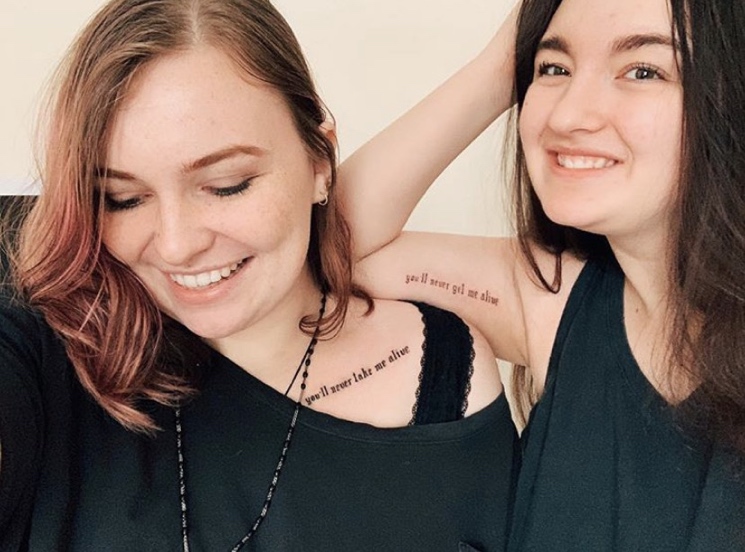
Amanda Cornwall has multiple MCR tattoos, including some for guitarist Frank Iero's solo music. She also runs an Instagram account where she promotes MCR art, and has developed a reputation as a designer of MCR flash tattoos.
"I started posting MCR art almost two years ago but got really involved and serious about it about a year ago when Frank retweeted my flash art on Twitter," she says. "Since then I've been really involved with MCR flash tattoos, drawing up tattoo commissions for fans based off of MCR songs, and also lately branching out into merch/poster designs, which I do just for fun."
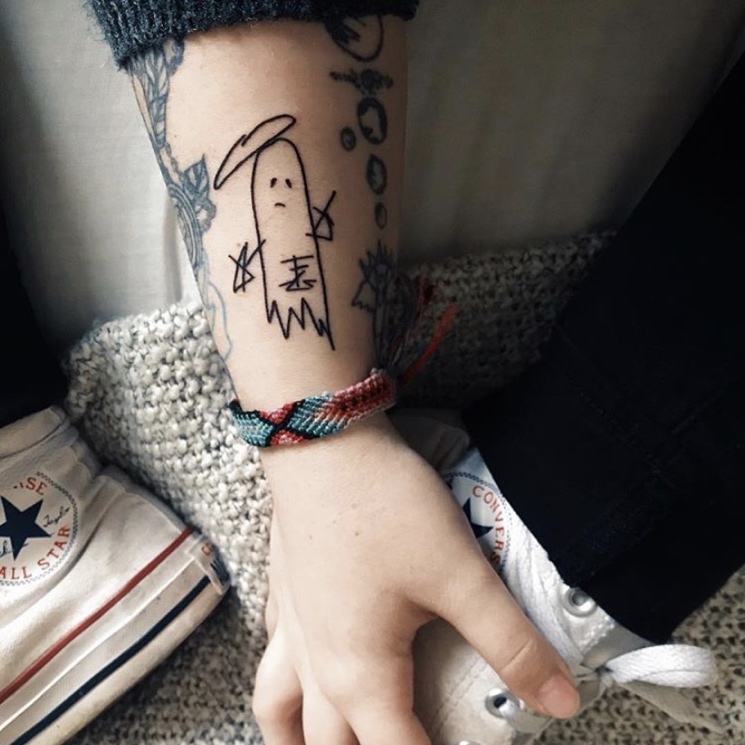
With their macabre artwork, vivid imagery and lyrical mottos, My Chemical Romance are one of the more popular bands to inspire not only tattoos, but creative arts broadly. Whether it's Instagram, Tumblr or DeviantArt, there is a bottomless pit of MCR-themed illustrations, paintings, poetry, and cosplay outfits.
"I love the art community in the MCR fan base and I love the friends I've made through it and everyone is so supportive and lovely and creative," Cornwall says. "I also love and appreciate the way the band foster creativity in their fan base. They know they have one of the most creative fan bases and they genuinely seem to appreciate that. I mean, they used a fan design for a poster at their show in December [2019]. That's not unheard of, but it's still so cool to see them supporting fan art so directly."
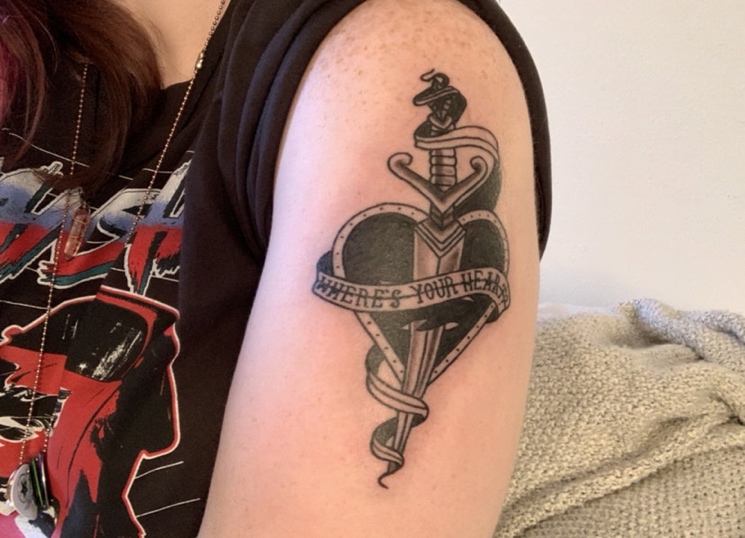
But what may be unheard of is what MCR did earlier this year, when they debuted a T-shirt featuring an iconic MCR tramp stamp that once made the rounds on Tumblr that belongs to former porn actor Mickey Taylor, who said he got the tattoo in "my peak fandom mixed with my rebellious who-gives-a-fuck phase" in an interview with Them.
"Honestly, the whole thing has been a pleasure," he added. "I just think they could have hired anyone — like some hot woman smoking a cigarette, as so many bands do — and called it 'edgy,' but they didn't. They hired the mixed-raced, queer, ex-sex worker and were the ones who came up with it."
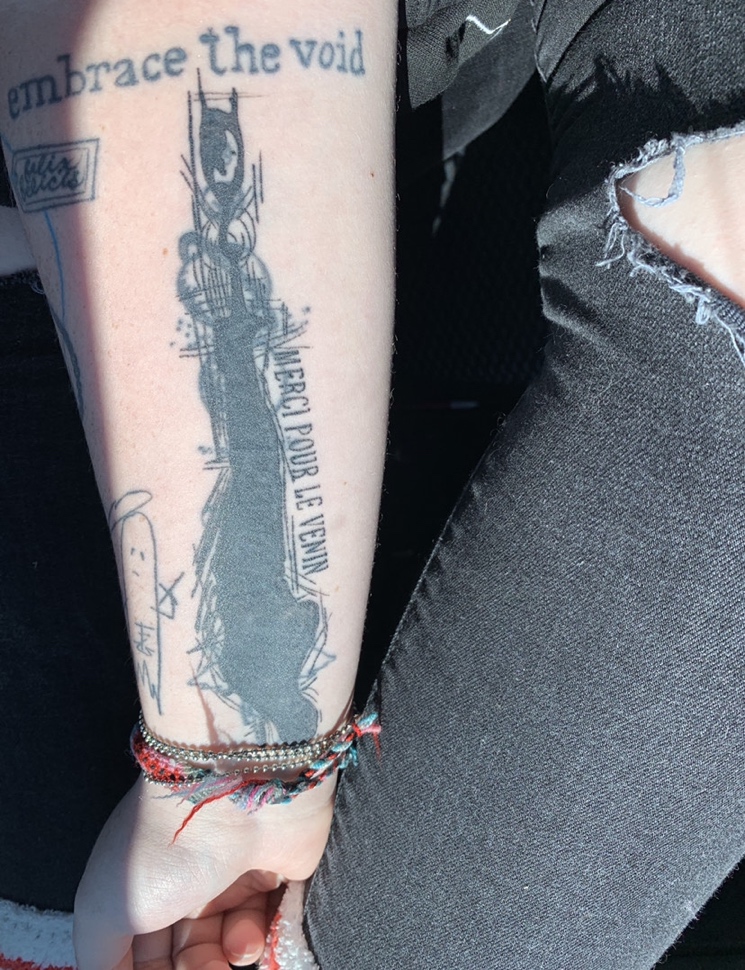
Fans had spent years waiting for the band to reunite, following their 2013 breakup. Things finally began to heat up in 2019, when Joe Jonas slyly let it slip that My Chemical Romance had been rehearsing next door to the Jonas Brothers. The first message from the band over socials concerned a one-off gig on December 20 at the Shrine Expo Hall in Los Angeles, CA, which received rave reviews. The hype machine was in high gear in January 2020 when tickets for their reunion tour went on sale — and the demand was such that Ticketmaster couldn't handle the traffic. Within six hours, all 18 of the band's tour dates sold out.
The stage was set for the group's full-fledged return in 2020 — but fans would have to keep on being patient for a couple more years. The first show of their tour had been planned for March 20 in Australia, with European dates set for the summer, and a North American tour running through the fall. The dates were postponed until 2021, and then postponed again. Fans couldn't help but feel cheated — their band had returned, only to be sidelined right when they were due to hit the road.
It's a very different reunion story than anyone could have expected, but that should come as no surprise: My Chemical Romance have always stood out from the crowd.
Formed in 2001 by aspiring comic book artist Gerard Way and named by his younger brother and bassist Mikey Way after an Irvine Welsh book, the band rose up amongst the ranks of New Jersey's underground punk scene seemingly overnight. With their dual guitar attack of Ray Toro and Frank Iero, MCR created a unique sound: a post-hardcore band with aspirations to write melodies as alluring as Blur, lyrics as dark as the Misfits, and arrangements as elaborate as Queen and as heavy as Iron Maiden.
They caught an early break when Thursday's Geoff Rickly produced their debut album, 2002's I Brought You My Bullets, You Brought Me Your Love, which earned them a major label deal with Reprise. With hits like "I'm Not Okay (I Promise)" and "Helena," their second album, 2004's Three Cheers For Sweet Revenge, sold three million copies thanks to their relentless touring.
Alongside Fall Out Boy and Panic! at the Disco, MCR were begrudgingly crowned emo's new poster boys, reaching the mainstream via rotation on MTV and the covers of NME and Spin. Their crowning moment was their third album, a death-obsessed and emotionally draining rock opera called The Black Parade. It would go on to sell more than five million copies worldwide and catapult them into rock stardom. But they would abandoning the doom and gloom act for their swan song, 2010's Danger Days: The True Lives of the Fabulous Killjoys, which saw them assume the persona of post-apocalyptic rock 'n' rollers. And, well, that was it.
When My Chemical Romance broke up in March 2013, rock music lost its last great mainstream band. It hasn't produced an album as large-scale or momentous as The Black Parade since, nor a concert as conceptual, theatrical and exhilarating as the one they performed every night on that tour.
In fact, the 2010s went on to become a disgraceful period for the genre, one that inspired an exhausting number of think pieces about how rock music had been hanged, drawn and quartered. (Jezebel summed it up best with theirs entitled, "The Decade in Rock That Rock Fans Hated.") Everyone from Robert Plant to Bring Me the Horizon condemned modern rock for becoming too boring — the latter even revolutionized their sound to avoid being classified as rock. The newest chart-toppers like Imagine Dragons and twenty one pilots were faceless and forgettable, while the old ones like Green Day and Weezer now looked like the Steve Buscemi meme where he says, "How do you do fellow kids?" Even the more credible rock stars like Kings of Leon, Foo Fighters and the Black Keys all continued to make the same album and play the same arena show.
It's no coincidence that, while rock music was struggling, pop music was only getting bigger. One of its biggest trends would be a shift towards darker, more vulnerable lyrics and imagery — exactly the sort of content that My Chemical Romance were creating. Had they kept going, who knows where MCR would belong now, but their influence also proved to be a profound one in the world of hip-hop. When artists such as Post Malone, Halsey, Lil Uzi Vert, Billie Eilish and Juice WRLD all expressed their love for My Chemical Romance, no one was too surprised. Even more obvious is the impact they've had on UK alt-rap bad boy Yungblud, who has mashed up his own songs with theirs, and the late Lil Peep, whose memorial service began with MCR's funereal "Helena" blasting through the speakers.
My Chemical Romance have remained omnipresent within the public's consciousness. Gerard Way and Frank Iero achieved some success with their respective musical projects, not to mention Way's comic book The Umbrella Academy, which was adapted by Netflix. Nostalgia also played its part. With the recent rebirth of Fall Out Boy and Panic! at the Disco as Billboard-topping pop acts, there has been renewed interest in the emo phenomenon of the 2000s. Streaming has seen to the band's hits being placed into decade-, genre- and mood-themed playlists, not to mention terrestrial and satellite radio continually programming them. It helped The Black Parade re-enter the Billboard 200 just weeks after announcing their return.
But beyond the music, the MCRmy — the fan base's official nickname — grew because of their undying presence on social media. They may have emerged during the rise of emo-friendly MySpace, as well as Facebook, but MCR's popularity took on a new, broader and more diverse life on the social sites that came afterwards. There is no shortage of Twitter and Instagram accounts dedicated to everything from Gerard pics to lyric-inspired fan art and tattoos (as explored in the section at the end of this piece). They've also become wildly popular on every tween's go-to social platform, Tik Tok, where a never-ending supply of MCR content is yours to discover. And let's not forget about "Frerard," a series of fan-fiction imagining a romance between Gerard Way and guitarist Frank Iero.
Jamie Ramirez shares a Twitter account called @MCROfficialST that has more than 56,000 followers as of this writing. "My friend Arielle and I run a street team all over social media, but we are mainly known on Twitter," she says. "We just wanted to create a safe space for people to share their love and passion for the band and the guys."
Part of what makes the extreme response to My Chemical Romance's reunion so fascinating is that they were only gone for seven years, which is almost as long as they were active. The fandom only seems to have intensified, but the MCRmy has also welcomed its share of new cadets. Breaking ground with younger listeners is a rare occurrence for older bands.
"They built up this fiercely loyal fan base and those same fans are the ones still here today, the ones who were waiting all those years for them to come back," says Amanda Cornwall, who attended their comeback show in Los Angeles. "They built this legacy and this beautiful thing that you see maybe once in a lifetime. And that legacy hung on during the breakup and brought in all these new fans too, so over the seven or so years they were gone their fan base just kept growing and growing."
Cornwall believes the positive, fostering environment they built for their fans is major reason for the continued loyalty. "I think it goes back to how sincere and supportive they are. And the fact that they seemed to be a safe space for more minority groups like women and LGBT people," she explains. "A lot of MCR fans, in my experience, feel safer to be themselves because of them and that would definitely be something that would make you more passionate about a band."
While inclusivity has become a widely discussed topic of late, My Chemical Romance were preaching it regularly, both from the stage and to the press. "I remember being at Warped Tour and seeing a lot of macho guys and saying: 'If you're a homophobe, if you're a racist or sexist, please don't watch us. There's no point,'" Gerard Way said to the The New York Times in 2014.
The same goes for mental health. At their peak, My Chemical Romance were one of but a few musical acts preaching the importance of mental health awareness and treating it as an illness. Despite being accused of leading an "emo suicide cult" in 2008 by the British tabloids following the death by suicide of 13-year-old Hannah Bond, My Chemical Romance regularly advocated for their fans to seek help.
"If you or someone you know are severely depressed, you need to fucking talk to somebody: your best friend, your mom, somebody in school, I don't give a fuck — because pissing away your life on suicide is fucking bullshit," Way said during a show on the Black Parade tour.
"The difference we wanna make is, number one, to let these kids know that they're not alone, that they're actually not that messed up and that they can do whatever they want."
Ramirez credits the band for helping her through tough times. "Middle school is an awkward year for almost every kid. I lost a lot of friends because of cliques and I was severely bullied," she says. "Overall, I just really felt like an outsider, and My Chem was this group of guys from Jersey into weird concepts. I guess it made me feel less alone, and I loved that. Their music helped me through all of the bullshit life threw at me."
Gerard Way has stated that My Chemical Romance ended because they felt they were no longer needed. The world was in a better place with Barack Obama in the White House, he told The Guardian in 2019. It was a good time for the band to make an exit. Of course, things have since changed. And as they saw the world get "super fucked-up again," he came to realize that it was "definitely in need of something positive."
Skeptics might say the reunion is merely a cash grab. On a number of occasions, Way had shot down that very idea. But a more altruistic reason might be part of the impetus. They certainly can't rid the world of crises — the pandemic that sidelined their reunion proved as much — but they can continue to change lives with their music, including new single "The Foundations of Decay," released this past May. Simply put, the world needs a band like My Chemical Romance more than ever, and it's a relief to have them back.
Fans and Their MCRt
Getting a tattoo of your favourite band's logo or lyrics used to simply be a badge of honour. It was an act of committing to permanent ink as a way of showing your dedication to their music. For some, it was even a way of getting free admission into shows (Google: Rocket from the Crypt tattoo free admission). But the tattoo game has changed. These days getting band ink is as much about self-identity as it is about the actual music.

Amanda Cornwall has multiple MCR tattoos, including some for guitarist Frank Iero's solo music. She also runs an Instagram account where she promotes MCR art, and has developed a reputation as a designer of MCR flash tattoos.
"I started posting MCR art almost two years ago but got really involved and serious about it about a year ago when Frank retweeted my flash art on Twitter," she says. "Since then I've been really involved with MCR flash tattoos, drawing up tattoo commissions for fans based off of MCR songs, and also lately branching out into merch/poster designs, which I do just for fun."

With their macabre artwork, vivid imagery and lyrical mottos, My Chemical Romance are one of the more popular bands to inspire not only tattoos, but creative arts broadly. Whether it's Instagram, Tumblr or DeviantArt, there is a bottomless pit of MCR-themed illustrations, paintings, poetry, and cosplay outfits.
"I love the art community in the MCR fan base and I love the friends I've made through it and everyone is so supportive and lovely and creative," Cornwall says. "I also love and appreciate the way the band foster creativity in their fan base. They know they have one of the most creative fan bases and they genuinely seem to appreciate that. I mean, they used a fan design for a poster at their show in December [2019]. That's not unheard of, but it's still so cool to see them supporting fan art so directly."

But what may be unheard of is what MCR did earlier this year, when they debuted a T-shirt featuring an iconic MCR tramp stamp that once made the rounds on Tumblr that belongs to former porn actor Mickey Taylor, who said he got the tattoo in "my peak fandom mixed with my rebellious who-gives-a-fuck phase" in an interview with Them.
"Honestly, the whole thing has been a pleasure," he added. "I just think they could have hired anyone — like some hot woman smoking a cigarette, as so many bands do — and called it 'edgy,' but they didn't. They hired the mixed-raced, queer, ex-sex worker and were the ones who came up with it."

